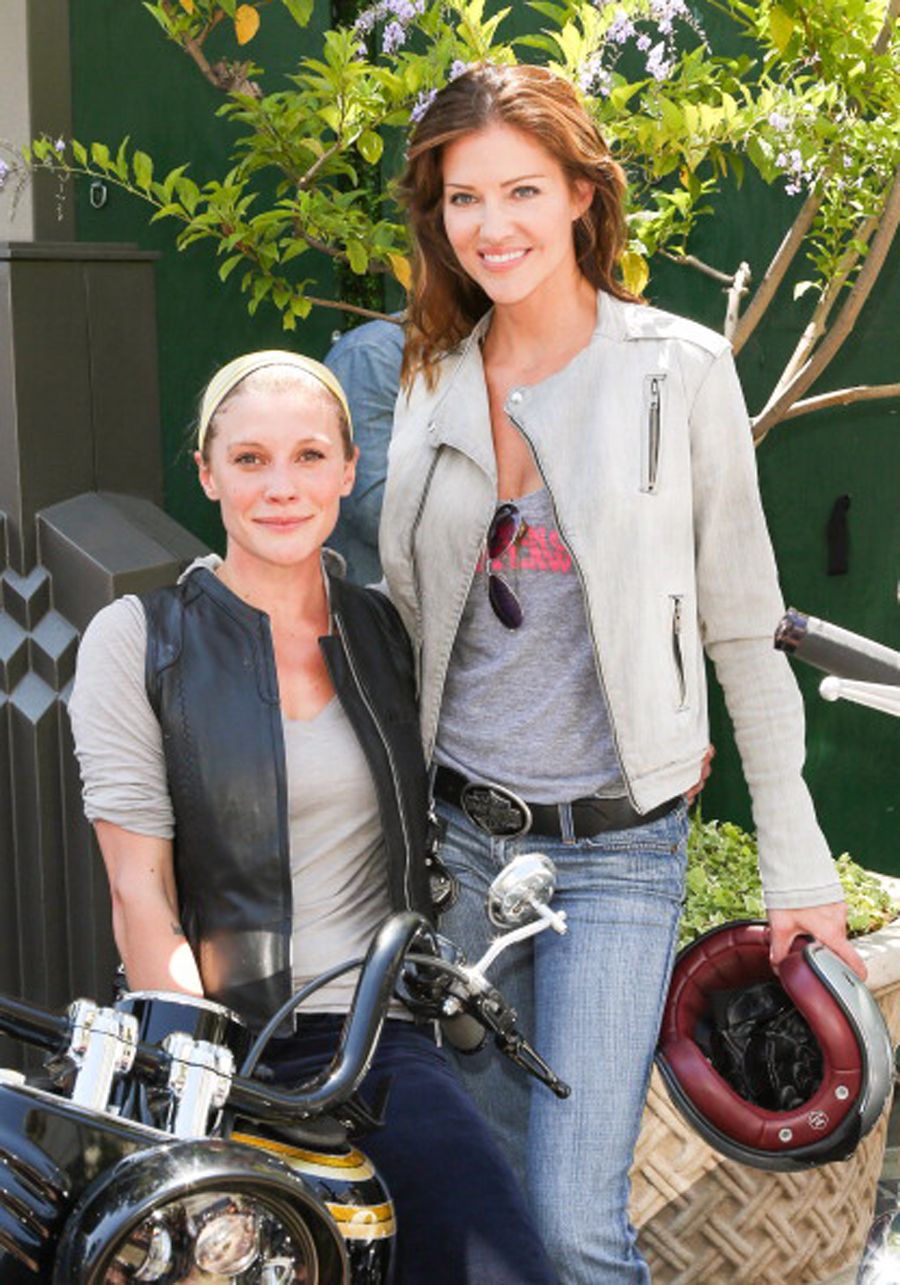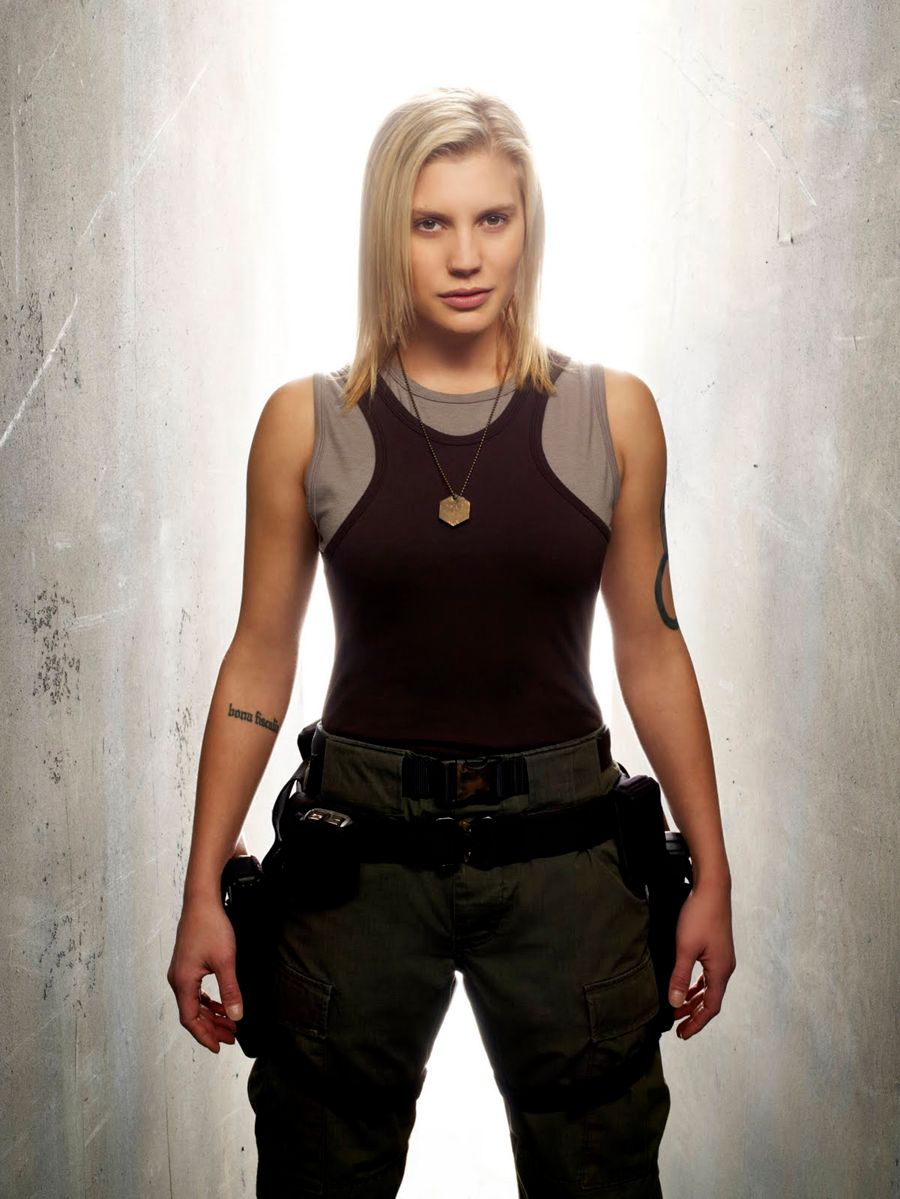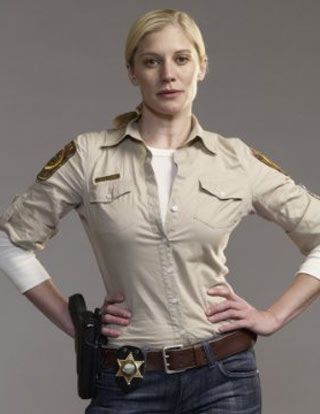With her haunted, hard-living portrayal of Starbuck on the reimagined Battlestar Galactica, Katee Sackhoff carved a unique place for herself in the genre landscape.
In the wake of that career-defining performance, Sackhoff has continued to action-oriented roles in projects like Riddick, the new horror thriller Oculus and the A&E crime drama Longmire, which is filming its third season. That rugged-individualist streak continues in her personal life too, where the actress teams with her Battlestar Galactica co-star Tricia Helfer for Acting Outlaws, a motorbike-riding charity outfit. Next week, the pair will host a ride in Seattle that includes a Battlestar Galactica screening on Saturday, April 26 at Paul Allen's Seattle Cinerama, with proceeds going to the Seattle Humane Society.
Before she took to the open road, Sackhoff spoke with Spinoff Online about the legacy of Battlestar Galactica on and off the screen, how she's defied typecasting in some ways and leaned into it in others, where she sees her action-heroine persona going, and what's in store for her character Vic Moretti when the third season of Longmire premieres in the fall.
Spinoff Online: Next week in Seattle, you and Tricia Helfer are doing the latest of your charity events while also screening an episode of Battlestar Galactica for fans. What is it about that series that seems to keep so many cast members tightly connected years after its finale?
Katee Sackhoff: I think one of the keys to relationships that carry after jobs is finding something else that you have in common. For Tricia and I, that was very easy. And for Michael Trucco as well. He's usually with us on these things. Beyond that, it's just a respect. Battlestar was a very interesting thing in that we all respected each other, we all really appreciated each other. That's not necessarily normal on television shows. You can either take people or leave them – just like in any profession. You usually have your co-workers who you like, and the other half you don't care if you ever see them again. You go on about your business, and when the job is done, relationships either carry on or they don't. With Battlestar, we all happened to really respect each other and like each other as well.
But for Tricia Helfer and I, it was even more than that. At one point during the first season, we realized that my boyfriend knew her husband. They both grew up in Louisiana, and they both went to Tulane, and her husband was my now fiancé's TA [teaching assistant] in college. So it kind of made it easy for us to start spending time together, and then we started riding motorcycle's together, and it grew from there. After a few years, we started the Acting Outlaws mostly in response to the Gulf oil spill and wanting to give something back to the city that raised the two men we loved. So we did a ride to raise money for relief efforts, and from there it kept getting bigger and bigger. We've done more rides for more charities, and in Seattle we do the Tulip Ride. This is our second year there raising money for the Humane Society and the Seattle Red Cross. Then for the rest of the year, we have a ride in Wyoming to raise money for Homes For Our Troops while I'm filming Longmire. Then we have one in California on Nov. 2 to raise money for a California-based homeless charity.
Battlestar is considered one of the great runs of the modern age of television, and it also has one of the most debated endings – particularly your role in it. When you're out there doing fan events like this, do you find yourself defending or working to keep the legacy of the show alive in a really saturated market for TV dramas?
Lucky enough, I've worked continuously since Battlestar, so I don't have to talk about it. People will come up to me and ask, and most of the fans seem to show that the show has gotten even more popular as the years have gone on. And that's great for them and for the show in general. The only thing that matters to me one way or the other is that people enjoy the work that we did.
Since playing Starbuck, you've seemed to push back from the kind of stereotypical Hollywood roles for actresses and maybe taken parts with a bit of a harder edge to them. What's been the challenge of building that kind of career for yourself?
Well, you've really got to look for those parts. And I've been lucky enough that I've been working consistently since I was 17, and I've saved my money. [Laughs] So the decisions I make now aren't based on financial stability. They're based on what I'm going to get the most out of personally and what I think the fans are going to enjoy. I was raised by parents who beat into my head to save all my money, and it's helped out a lot at this point in my career because I don't have to take jobs to pay the mortgage.
And I don't bring that up to teach people they should save their money. [Laughs] I bring it up to show the correlation to that freedom of choice. The freedom is there for me to take smaller movies with more interesting roles like Oculus, which I thought was an incredibly interesting character study. And then there are things like Riddick, which may seem similar to Starbuck to some people, but to me if felt completely different. And there are a lot of people out there who never saw Battlestar Galactica and don't know who Starbuck was. So to take that strong type of character into a medium like film and play it on the big screen was an opportunity I couldn't pass up.
When you read the trades, you hear things like producers wanting to cast an all-female version of The Expendables, which seems at face value to be harder to build up with action heroines. But your name easily fits into a mold like that now. Does that kind of thing make you fear typecasting?
That kind of thing doesn't bother me because I enjoy playing those roles. I'd absolutely be part of a movie like that, and I think there are more women who could play in a movie like that than you might realize. If you went out and Googled "tough, strong action women" there would be probably 25 that would pop up. And those names might not be as big as Schwarzenegger, but we also don't make movies like we did in the '90s anymore. It's a very different business. I personally enjoy those roles a lot, and just because you've played those roles doesn't mean you can't turn around and do a romantic comedy right after that if you want. The business is actually more open than people think. It's just a matter of timing and whether or not I can fit something in.
In the immediate future, you're returning to film Season 3 of Longmire this month. Once you get a few seasons into a show like that, does it free up the writers and producers to do something different with the format and be a little more ambitious?
Absolutely. The third year of a series is an interesting thing because there's more freedom from the network as well. The first season is where by the skin of your teeth you get picked up for a second season. Then the second season comes around, and everyone worried that it's going to be sophomore-itis and you're going to fail to live up to the first season. But by the time you hit your third season, the network says, "Awesome. You're an old hat at this, so you do what you're going to do, and we're going over here to pay attention to the freshman and sophomore series that we have to manage with a fine-tooth comb."
So there's more freedom to do what you want to do, but at the same time, you've already set up all the characters. You don't need to describe them anymore, and you're able to move away from more proceduralized shows and into more serialized ones.
Your character Vic ended Season 2 putting herself out a bit more and maybe being a bit more vulnerable as a result. Where does she pick things up this year?
I think we'll see more of that with Vic, but she's also in an interesting place with her relationship at home. Then there's this dark cloud of that guy who followed her out from Philadelphia to make her pay for decisions she made back home. All of that will come to a head this season.




